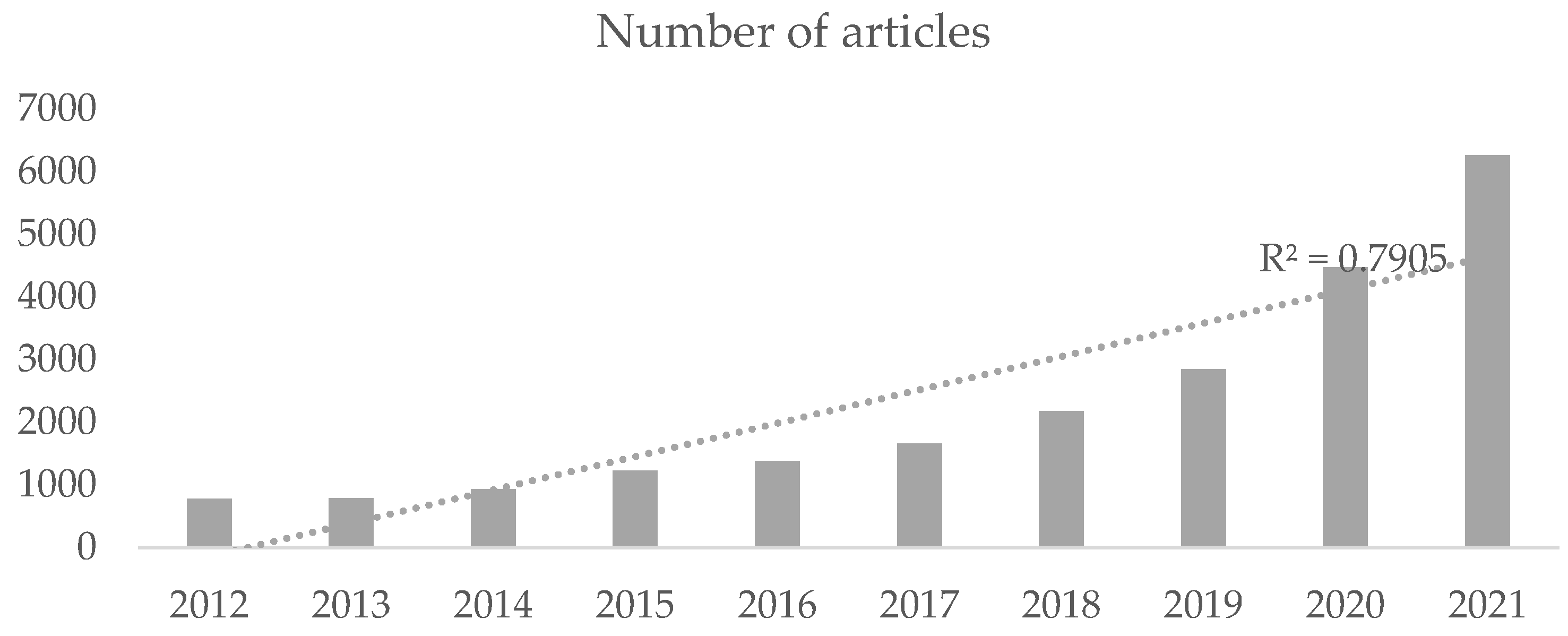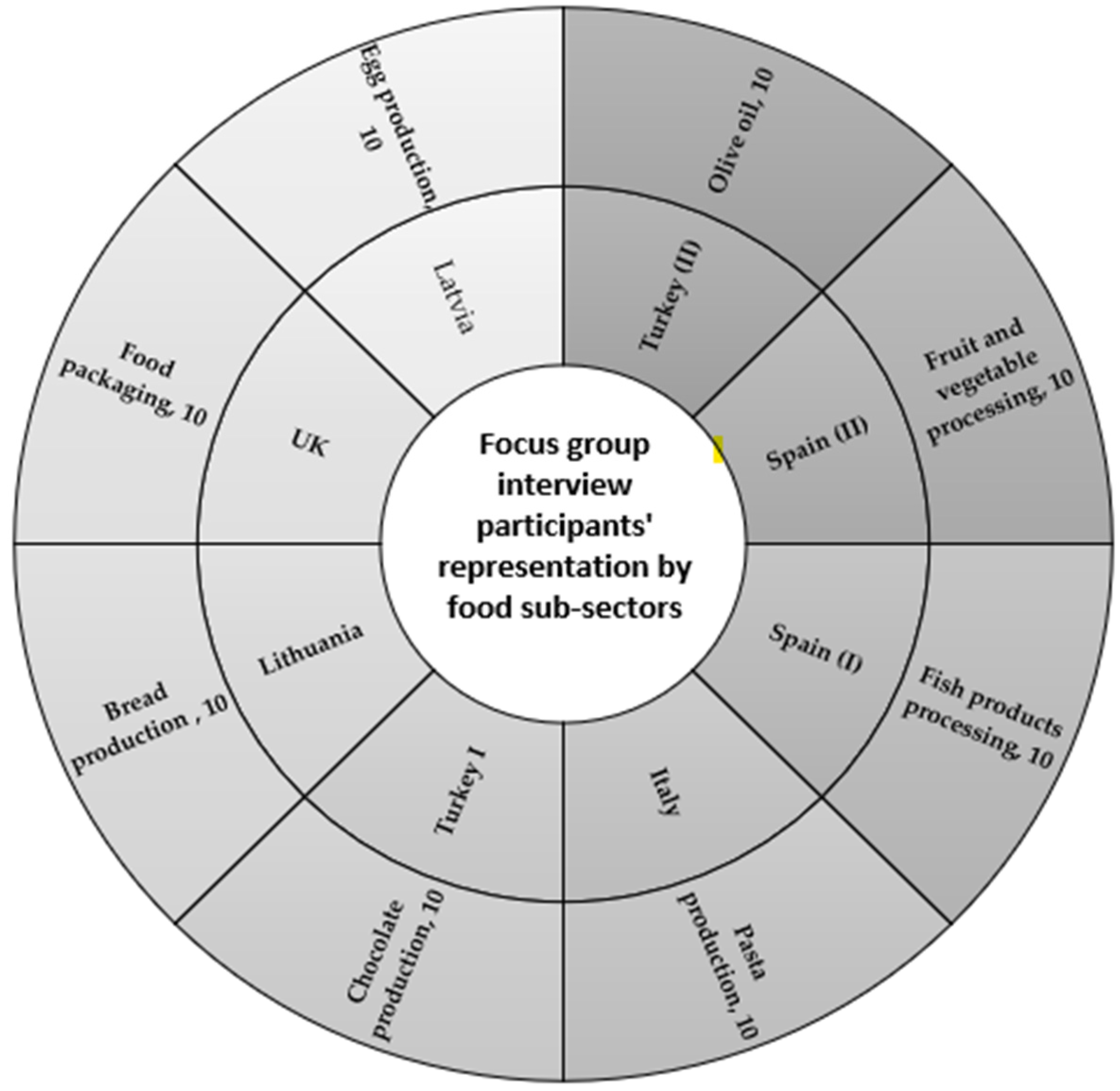ESG Investing Issues in Food Industry Enterprises: Focusing on On-the-Job Training in Waste Management
Abstract
:1. Introduction
2. Materials and Methods
3. Results
3.1. Discourses in Interpretation of Investment and the Role of Social Aspects in ESG Investing
3.2. Food Sector Requirements for Contemporary Waste Management Training in Selected European Countries
4. Discussion
5. Conclusions
Author Contributions
Funding
Institutional Review Board Statement
Informed Consent Statement
Data Availability Statement
Conflicts of Interest
Appendix A. Focus Group Interview Questions
| I Questions for discussion of the waste hierarchy skills of employees who work in food sub-sector | 1. What knowledge on waste hierarchy do employees (who work in food production/processing units) need to enhance the waste minimization in sub-sector enterprises? 2. What skills in dealing with waste hierarchy issues do employees (who work in food production/processing units) need to enhance the waste minimization in sub-sector enterprises? 3. What types of responsibility/autonomy related with waste hierarchy issues are necessary for employees (who work in food production/processing units) to enhance the overall waste minimization in sub-sector enterprises? 4. What are the main shortcomings that sub-sector enterprises need to address regarding the waste hierarchy issues? |
| II Questions for discussion of the waste reduction and disposal skills of employees who work in food sub-sector | 1. What knowledge on the waste reduction and disposal do employees (who work in food production/processing units) need to enhance waste minimization in sub-sector enterprises? 2. What skills in dealing with the waste reduction and disposal do employees (who work in food production/processing units) need to enhance waste minimization in sub-sector enterprises? 3. What types of responsibility/autonomy related with the waste reduction and disposal issues are necessary for employees (who work in food production/processing units) to enhance the overall waste minimization in sub-sector enterprises? 4. What are the main shortcomings that sub-sector enterprises need to address regarding the waste reduction and disposal issues |
| III Questions for discussion of the waste minimization skills of employees who work in food sub-sector | 1. What knowledge on the waste minimization do employees (who work in food production/processing units) need to enhance the overall waste minimization in sub-sector enterprises? 2. What skills in dealing with the waste minimization do employees (who work in food production/processing units) need to enhance waste the overall minimization in sub-sector enterprises? 3. What types of responsibility/autonomy related with the waste minimization issues are necessary for employees (who work in food production/processing units) to enhance the overall waste minimization in sub-sector enterprises? 4. What are the main shortcomings that sub-sector enterprises need to address regarding the waste minimization issues? |
| IV Questions for discussion of the waste recycling and recovery skills of employees who work in food sub-sector | 1. What knowledge on the waste recycling and recovery do employees (who work in food production/processing units) need to enhance the overall waste minimization in sub-sector enterprises? 2. What skills in dealing with the waste recycling and recovery do employees (who work in food production/processing units) need to enhance the overall waste minimization in sub-sector enterprises? 3. What types of responsibility/autonomy related with the waste recycling and recovery issues are necessary for employees (who work in food production/processing units) to enhance the overall waste minimization in sub-sector enterprises? 4. What are the main shortcomings that sub-sector enterprises need to address regarding the waste recycling and recovery issues? |
References
- Agenda for Sustainable Development. 2015. UN General Assembly, Transforming Our World: The 2030 Agenda for Sustainable Development, A/RES/70/1. October 21. Available online: https://www.refworld.org/docid/57b6e3e44.html (accessed on 1 August 2022).
- Association for European Life Science Universities (ICA). n.d. Available online: https://www.ica-europe.info/ (accessed on 7 September 2022).
- Baartman, Liesbeth K. J., and Elly de Bruijn. 2011. Integrating knowledge, skills and attitudes: Conceptualising learning processes towards vocational competence. Educational Research Review, 125–133. [Google Scholar] [CrossRef]
- Bianchi, Guia, Ulrike Pisiotis, and Marcelino Cabrera Giraldez. 2022. GreenComp. The European Sustainability Competence Framework. Available online: https://green-comp.eu/wp-content/uploads/2022/02/jrc128040_greencomp_f2.pdf (accessed on 8 August 2022).
- Burke, Jenna J. 2022. Do boards take environmental, social, and governance issues seriously? Evidence from Media Coverage and CEO Dismissals. Journal of Business Ethics 176: 647–71. [Google Scholar] [CrossRef]
- European Centre for the Development of Vocational Training (CEDEFOP). n.d. Skills and Labour Market. Available online: https://www.cedefop.europa.eu/en/themes/skills-labour-market (accessed on 15 September 2022).
- Dardar, Abdul Hakim Ahmad, Ahmad Jusoh, and Amran Rasli. 2012. The impact of job training, job satisfaction and alternative job opportunities on job turnover in Libyan oil companies. Procedia-Social and Behavioral Sciences 40: 389–94. [Google Scholar] [CrossRef]
- Davis, G. 2008. Formulating an effective higher education curriculum for the Australian waste management sector. Waste Management 28: 1868–75. [Google Scholar] [CrossRef] [PubMed]
- Directive 2014/95/EU of the European Parliament and of the Council of 22 October 2014 amending Directive 2013/34/EU as Regards Disclosure of Non-Financial and Diversity Information by Certain Large Undertakings and Groups. 2014. Official Journal of the European Union. Available online: https://eur-lex.europa.eu/legal-content/EN/TXT/?uri=CELEX%3A32014L0095 (accessed on 31 July 2022).
- ESG Investing. 2022. The Economist: Special Reports, July 23. Available online: https://www.economist.com/special-report/2022-07-23 (accessed on 24 July 2022).
- Fetting, Constanze. 2020. The European Green Deal. ESDN Report. Vienna: ESDN Office. [Google Scholar]
- Grinberga-Zalite, Gunta, and Andra Zvirbule. 2022. Analysis of Waste Minimization Challenges to European Food Production Enterprises. Emerging Science Journal 6: 530–43. [Google Scholar] [CrossRef]
- Gusenbauer, Michael, and Neal R. Haddaway. 2020. Which academic search systems are suitable for systematic reviews or meta-analyses? Evaluating retrieval qualities of Google Scholar, PubMed, and 26 other resources. Research Synthesis Methods 11: 181–217. [Google Scholar] [CrossRef] [PubMed]
- Haddaway, Neal Robert, Alexandra Mary Collins, Deborah Coughlin, and Stuart Kirk. 2015. The role of Google Scholar in evidence reviews and its applicability to grey literature searching. PLoS ONE 10: e0138237. [Google Scholar] [CrossRef] [PubMed]
- Hughes, Arthur, Michael A. Urban, and Dariusz Wójcik. 2021. Alternative ESG Ratings: How Technological Innovation Is Reshaping Sustainable Investment. Sustainability 13: 3551. [Google Scholar] [CrossRef]
- Hvidkjær, Søren. 2017. ESG Investing: A Literature Review. Frederiksberg: Dansif, Copenhagen Business School. [Google Scholar]
- KPMG and Eversheds Sutherland. 2020. Climate Change and Corporate Value. pp. 4–32. Available online: https://assets.kpmg/content/dam/kpmg/xx/pdf/2021/03/climate-change-and-corporate-value.pdf (accessed on 14 July 2022).
- MapChart Europe. n.d. Available online: https://www.mapchart.net/europe.html (accessed on 31 July 2022).
- Merker, Christopher K., and Sarah W. Peck. 2019. ESG Challenges. The Trustee Governance Guide. Cham: Palgrave Macmillan, pp. 123–28. [Google Scholar]
- Meyer, John P., and Natalie J. Allen. 1997. Commitment in the Workplace: Theory, Research, and Application. Thousand Oaks: Sage Publications. [Google Scholar]
- Muduli, Kamalakanta, and Akhilesh Barve. 2012. Challenges to waste management practices in Indian health care sector. In International Conference on Environment Science and Engineering (IPCBEE). Singapore: IACSIT Press, vol. 32. [Google Scholar]
- Noe, Raymond A., and Steffanie L. Wilk. 1993. Investigation of the factors that influence employees’ participation in development activities. Journal of Applied Psychology 78: 291. [Google Scholar] [CrossRef]
- Omidiani, Afsanehsadat, and S. Hashemi Hezaveh. 2016. Waste management in hotel industry in India: A review. International Journal of Scientific and Research Publications 6: 670–80. [Google Scholar]
- Otles, Semih, Stella Despoudi, Camelia Bucatariu, and Canan Kartal. 2015. Food waste management, valorization, and sustainability in the food industry. In Food Waste Recovery. New York: Academic Press, pp. 3–23. [Google Scholar]
- Pástor, Ľuboš, Robert F. Stambaugh, and Lucian A. Taylor. 2021. Sustainable investing in equilibrium. Journal of Financial Economics 142: 550–71. [Google Scholar] [CrossRef]
- Pouliakas, Konstantinos. 2021. Understanding Technological Change and Skill Needs: Technology and Skills Foresight. Cedefop Practical Guide 3. Thessaloniki: CEDEFOP-European Centre for the Development of Vocational Training, Finikas. [Google Scholar]
- Riccardo, Boffo, and Robert Patalano. 2020. ESG Investing: Practices, Progress and Challenges. Paris: Éditions OECD. Available online: https://www.oecd.org/finance/ESG-Investing-Practices-Progress-Challenges.pdf (accessed on 8 August 2022).
- Schmidt, Anatoly B. 2021. The ESG Conundrum: An Outsider’s View. Available online: https://ssrn.com/abstract=3942572 (accessed on 31 August 2022).
- Sealey, B. J., Paul S. Phillips, and G. J. Hill. 2001. Waste management issues for the UK ready-mixed concrete industry. Resources, Conservation and Recycling 32: 321–31. [Google Scholar] [CrossRef]
- Serafeim, George. 2021. ESG: Hyperboles and Reality. Harvard Business School Research Paper Series Working Paper: 22-031. Rochester: SSRN. [Google Scholar]
- Shoaf, Lisa M., and Michael G. Shoaf. 2006. The hidden advantages of focus group interviews in educational research. Journal of School Public Relations 27: 342–54. [Google Scholar] [CrossRef]
- Snyder, Hannah. 2019. Literature review as a research methodology: An overview and guidelines. Journal of Business Research 104: 333–39. [Google Scholar] [CrossRef]
- The EU Taxonomy for Sustainable Activities. 2020. Regulation (EU) 2020/852 of the European Parliament and of the Council of 18 June 2020 on the Establishment of a Framework to Facilitate Sustainable Investment, and Amending Regulation (EU) 2019/2088. Available online: https://eur-lex.europa.eu/legal-content/EN/TXT/?uri=CELEX:32020R0852 (accessed on 31 August 2022).
- The Paris Agreement/UNFCCC. 2018. Agreement on 21st Paris Conference of the Parties of the United Nations Framework Convention on Climate Change/Ministry of Justice. Available online: https://doi.org/10.29171/acku_pamphlet_k3585_5_a47_2018_n1288_english_title1 (accessed on 8 August 2022).
- Vogt, W. Paul, and R. Burke Johnson. 2015. The SAGE Dictionary of Statistics & Methodology: A Nontechnical Guide for the Social Sciences. Thousand Oaks: Sage Publications. [Google Scholar]
- Ward, Vicky, Allan House, and Susan Hamer. 2009. Developing a framework for transferring knowledge into action: A thematic analysis of the literature. Journal of Health Services Research & Policy 14: 156–64. [Google Scholar]
- Wong, Geoff, Trish Greenhalgh, Gill Westhorp, Jeanette Buckingham, and Ray Pawson. 2013. RAMESES publication standards: Realist syntheses. BMC Medicine 11: 21. [Google Scholar] [CrossRef] [PubMed]
- Zientek, Linda R., Jon M. Werner, Mariela V. Campuzano, and Kim Nimon. 2018. The use of Google Scholar for research and research dissemination. New Horizons in Adult Education and Human Resource Development 30: 39–46. [Google Scholar] [CrossRef]





| Variable | Egg Production | Food Packaging | Bread Production | Chocolate Production | Pasta Production | Fish Product Processing | Fruit and Vegetable Processing | Olive Oil Production |
|---|---|---|---|---|---|---|---|---|
| k | 0.87 | 0.75 | 0.80 | 0.84 | 0.80 | 0.51 | 0.84 | 0.52 |
| Social Investing | ESG Investing | Financial Investing |
|---|---|---|
| Investment with measurable environmental and/or social return | Investment aimed at enhancing long-term value by using ESG factors to mitigate risks and identify growth opportunities | Limited or no regard for environmental, social or governance practices |
| Social and financial return Use of ESG metrics and methodologies | Financial return Use financial return metrics and methodologies | |
Publisher’s Note: MDPI stays neutral with regard to jurisdictional claims in published maps and institutional affiliations. |
© 2022 by the authors. Licensee MDPI, Basel, Switzerland. This article is an open access article distributed under the terms and conditions of the Creative Commons Attribution (CC BY) license (https://creativecommons.org/licenses/by/4.0/).
Share and Cite
Grinberga-Zalite, G.; Zvirbule, A. ESG Investing Issues in Food Industry Enterprises: Focusing on On-the-Job Training in Waste Management. Soc. Sci. 2022, 11, 424. https://doi.org/10.3390/socsci11090424
Grinberga-Zalite G, Zvirbule A. ESG Investing Issues in Food Industry Enterprises: Focusing on On-the-Job Training in Waste Management. Social Sciences. 2022; 11(9):424. https://doi.org/10.3390/socsci11090424
Chicago/Turabian StyleGrinberga-Zalite, Gunta, and Andra Zvirbule. 2022. "ESG Investing Issues in Food Industry Enterprises: Focusing on On-the-Job Training in Waste Management" Social Sciences 11, no. 9: 424. https://doi.org/10.3390/socsci11090424
APA StyleGrinberga-Zalite, G., & Zvirbule, A. (2022). ESG Investing Issues in Food Industry Enterprises: Focusing on On-the-Job Training in Waste Management. Social Sciences, 11(9), 424. https://doi.org/10.3390/socsci11090424






